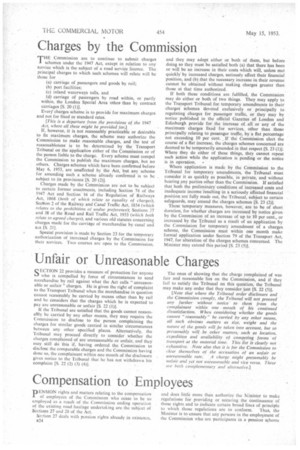Charges by the Commission
Page 58

If you've noticed an error in this article please click here to report it so we can fix it.
THE Commission are to continue to submit charges schemes under the 1947 Act, except in relation to any service which is the subject of a road service licence. The principal charges to which such schemes will relate will be those for
(a) carriage of passengers and goods by rail; (b) port facilities; (c) inland waterways tolls, and (d) carriage of passengers by road within, or partly within, the London Special Area othets than by contract carriages [S. 20 (1)].
Every charges scheme is to provide for maximum charges and not for fixed or standard rates.
[This is a departure from the provisions of the 1947 Act, where all these might be provided for.]
If, however, it is not reasonably practicable or desirable to fix maximum charges, the scheme may authorize the Commission to make reasonable charges, and the test of reasonableness is to be determined by the Transport Tribunal on the application either of the Commission or of the person liable to the charge. Every scheme must compel the Commission to publish the maximum charges, but no others. Charges schemes which have been confirmed before May 6, 1953, are unaffected by the Act, but any scheme for amending such a scheme already confirmed is to be subject to its provisions [S. 20(2)].
Charges made by the Commission are not to be subject to certain former enactments, including Section 74 of the 1947 -Act and Section 16 of the Regulation of Railways Act, 1868 (both of which relate to equality of charges); Sectlion 2 of the Railway and Canal Traffic Act, 1854 (which relates to the prohibition of undue preference); Sections 37 and 38 of the Road and Rail Traffic Act, 1933 (which both relate to agreed charges), and various old statutes concerning charges made for the carriage of merchandise by canal and sea [S. 21].
Special provision is made by Section 23 for the temporary authorization of increased charges by the Commission for their services. Two courses arc open to the Commission. and they may adopt either or both of them, but before doing so they must be satisfied both (a) that there has been or will be an increase in their costs which will, unless met quickly by increased charges, seriously affect their financial position, and (b).that the necessary increase in their revenue cannot be obtained without making charges greater than those at that time authorized.
If both these conditions are fulfilled, the Commission may do either or both of two things. They may apply to the Transport Tribunal for temporary amendments to their charges schemes devoted exclusively or principally to regulating charges for passenger traffic, or they may by notice published in the official Gazettes of London and Edinburgh provide for the increase of all or any of the maximum charges fixed for services, other than those principally relating to passenger traffic, by a flat percentage not exceeding 10 per cent. If the Commission elect the course of a flat increase, the charges schemes concerned are deemed to be temporarily amended in that respect [S. 23 (I)]. Where they do either of these things, they cannot repeat such action while the application is pending or the notice is in operation.
Where application is made by the Commission to the Tribunal for temporary amendments, the Tribunal must consider it as quickly as possible, in private, and without hearing any parties other than the Commission. If satisfied that both the preliminary conditions of increased costs and inadequate income resulting in a seriously affected financial position are fully made out, the Tribunal, subject to certain safeguards, may amend the charges schemes [S. 23 (2)1.
These temporary measures, however, are to be of short duration, for whether charges are increased by notice given by the Commission of an increase of up to 10 per cent., or increased by the Tribunal as a result of an application by the Commission for temporary amendment of a charges scheme, the Commission must within one month make formal application under Section 79 of the Transport Act, 1947, for alteration of the charges schemes concerned. The Minister may extend this period [S. 23 (5)].




























































































